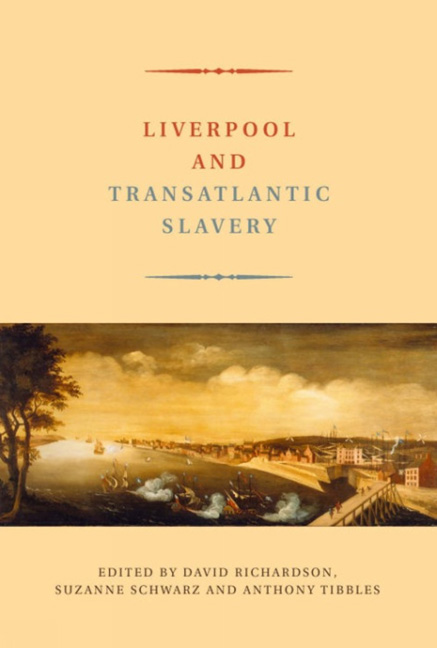Book contents
- Frontmatter
- Content
- Preface
- Notes on Contributors
- Introduction Liverpool, the African Slave Trade and Abolition Thirty Years On
- 1 Liverpool's Dominance in the British Slave Trade, 1740–1807
- 2 African Agency and the Liverpool Slave Trade
- 3 Human Capital in the British Slave Trade
- 4 Liverpool's Slave Trade to the Colonial Chesapeake: Slaving on the Periphery
- 5 The Liverpool Slave Trade, Lancaster and its Environs
- 6 The Atlantic Slave Trade and African Ethnicities in Seventeenth-Century Jamaica
- 7 The Wealth and Social Aspirations of Liverpool's Slave Merchants of the Second Half of the Eighteenth Century
- 8 ‘Cemented by the Blood of a Negro’? The Impact of the Slave Trade on Eighteenth-Century Liverpool
- 9 Commerce, Civilization and Christianity: The Development of the Sierra Leone Company
- 10 Abolitionism in Liverpool
- Index
2 - African Agency and the Liverpool Slave Trade
- Frontmatter
- Content
- Preface
- Notes on Contributors
- Introduction Liverpool, the African Slave Trade and Abolition Thirty Years On
- 1 Liverpool's Dominance in the British Slave Trade, 1740–1807
- 2 African Agency and the Liverpool Slave Trade
- 3 Human Capital in the British Slave Trade
- 4 Liverpool's Slave Trade to the Colonial Chesapeake: Slaving on the Periphery
- 5 The Liverpool Slave Trade, Lancaster and its Environs
- 6 The Atlantic Slave Trade and African Ethnicities in Seventeenth-Century Jamaica
- 7 The Wealth and Social Aspirations of Liverpool's Slave Merchants of the Second Half of the Eighteenth Century
- 8 ‘Cemented by the Blood of a Negro’? The Impact of the Slave Trade on Eighteenth-Century Liverpool
- 9 Commerce, Civilization and Christianity: The Development of the Sierra Leone Company
- 10 Abolitionism in Liverpool
- Index
Summary
The concepts of trust and networking have been powerful tools in the hands of historians seeking to explore the factors that underpinned the rise of the Atlantic economy from the seventeenth century onwards. Familial and other relationships, often reinforced by transplanting family members from Europe to distant parts of the Atlantic Basin, are seen as having been critical in nurturing trust between commercial agents on different sides of the Atlantic and thereby facilitating the flows of credit needed to unlock the resources of the New World. Without such credit flows and the networks upon which they rested, the growth of transatlantic trade would have been slower than it was. This was true, regardless of whether one looks at trades in commodities such as sugar and tobacco, or in the trade in enslaved Africans that underwrote production of such staples. Credit lubricated the supply of labour inputs into and the production of outputs from the plantation zones of the Americas, enabling merchant communities in many parts of the Atlantic world, including Liverpool, to prosper from the exploitation of enslaved African labour. Trust and networking underpinned credit security and trade growth.
Other papers in this volume reinforce the significance attaching to family ties in consolidating trust and promoting trade between Liverpool and the Atlantic world in the eighteenth century. In particular, they show how transplanted Liverpudlians and others from north–west England took on slave factorage and other activities in the West Indies on behalf of Liverpool clients, often acting as agents to collect debts arising from sales of slaves and other goods to local merchants and planters. While networking remained an enduring feature of Liverpool's transatlantic commercial dealings, it is also evident that continuing growth of Liverpool's slave trade from the 1730s depended on more than family ties to support it. By the 1750s, indeed, credit relationships with the West Indies were rooted in institutional arrangements that largely bypassed family ties. These more impersonal mechanisms of debt collection revolved around bill remittances drawn on London and other sugar consignment and banking houses. They remained intact until Parliament outlawed the British slave trade in 1807.
- Type
- Chapter
- Information
- Liverpool and Transatlantic Slavery , pp. 43 - 65Publisher: Liverpool University PressPrint publication year: 2007



